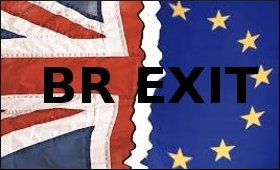|

|
Brexit won't hit European economy hard: IMF
|
|

|
|
| Top Stories |
 |
|
|
|
IANS | 20 Jul, 2018
The United Kingdom's planned exit from the European Union will have a
small negative impact on the bloc's economy, although it will prove more
damaging to countries such as Ireland, the Netherlands and Belgium that
have closer links with Britain, the International Monetary Fund said
Thursday.
In its annual review of the eurozone's economic
policies, the Washington, DC-based institution also warned that failure
to reduce the large trade surpluses recorded by Germany and some other
members could provoke a protectionist response from their partners, as
evidenced by recent tariffs imposed by the United States on steel and
aluminum imports from the EU, Efe cited a report from Dow Jones
Newswires.
"The strength of euro area-UK integration implies that there would be no Brexit winners," the IMF said.
The
IMF's analysis of the costs of Brexit to the rest of the EU is its
first since the June 2016 vote, and concludes that it will be more
damaging to the UK than the rest of the bloc, but that after 40 years of
deepening trade, financial and migration ties, no country will benefit.
The
study comes as even the broad outlines of the way in which the UK will
leave the bloc in March 2019 remain uncertain, as Prime Minister Theresa
May struggles to reconcile opposing views within her ruling
Conservative Party.
"We are very concerned," said Mahmood
Pradhan, the deputy director of the IMF's European department. "It is
quite late in the process and we don't have any clarity. We are getting
close to some very important deadlines."
The IMF's economists
examined two scenarios at opposite ends of the range of possible exit
deals. In the first, the UK negotiates a free-trade agreement with the
rest of the EU in which tariffs on goods remain at zero and the
non-tariff costs of trade rise "moderately." It also assumes that
exports of UK financial services to the EU fall by "about" 40 percent.
In
the second scenario, the UK leaves the EU without a free-trade
agreement, and commerce between the two is governed by the rules of the
World Trade Organization.
Under that scenario, tariffs on goods
would rise, and the non-tariff costs of engaging in trade would be twice
as high as under the first scenario.
The IMF's economists
calculate that under the first scenario, which they call "optimistic,"
there is very little damage to the EU economy.
In the second,
"pessimistic" scenario, the loss of output could be as large as 1.5
percent. over a period of between five and 10 years.
However, the losses suffered by some EU members could be much larger, Dow Jones added in a report supplied to EFE.
Among
EU members, Ireland has the closest economic ties with the UK, and
could see its GDP reduced by more than 2.5 percent under the
"optimistic" scenario and by almost 4 percent under the "pessimistic"
scenario.
The IMF said it would publish equivalent estimates for the UK in Sept., but they will be larger than those of Ireland.
The
Irish government continues to hope that the UK negotiates a free-trade
agreement, and that there is no need for customs checks on its land
border with Northern Ireland, which is part of the UK.
However,
Ireland announced Wednesday that it will hire 1,000 new staff for its
ports and airports to cope with the possibility of new customs
requirements linked to Brexit.
Reviewing the outlook for the
eurozone, the IMF said economic growth has likely passed its peak, and
urged the European Central Bank to remain cautious as it mulls steps to
wind down its stimulus measures.
It noted that some of the currency area's members are running "excessive" surpluses in their trade with other countries.
It noted that Germany's current account surplus hit 8 percent of GDP in 2017, while the Netherlands' was almost 10 percent.
"If
left unchecked, they could stoke protectionism among major trading
partners, with costly economic and political ramifications," the IMF
warned.
It said the German government should raise its investment spending, and encourage higher wage deals.
|
|
|
| |
|
|
|
|
|
|
|
|
|
|
|
|
|
|
| |
| Customs Exchange Rates |
| Currency |
Import |
Export |
US Dollar
|
66.20
|
64.50 |
UK Pound
|
87.50
|
84.65 |
Euro
|
78.25
|
75.65 |
| Japanese
Yen |
58.85 |
56.85 |
| As on 13 Aug, 2022 |
|
|
| Daily Poll |
 |
 |
| PM Modi's recent US visit to redefine India-US bilateral relations |
|
|
|
|
|
| Commented Stories |
 |
|
|
|
|
|
| |
|